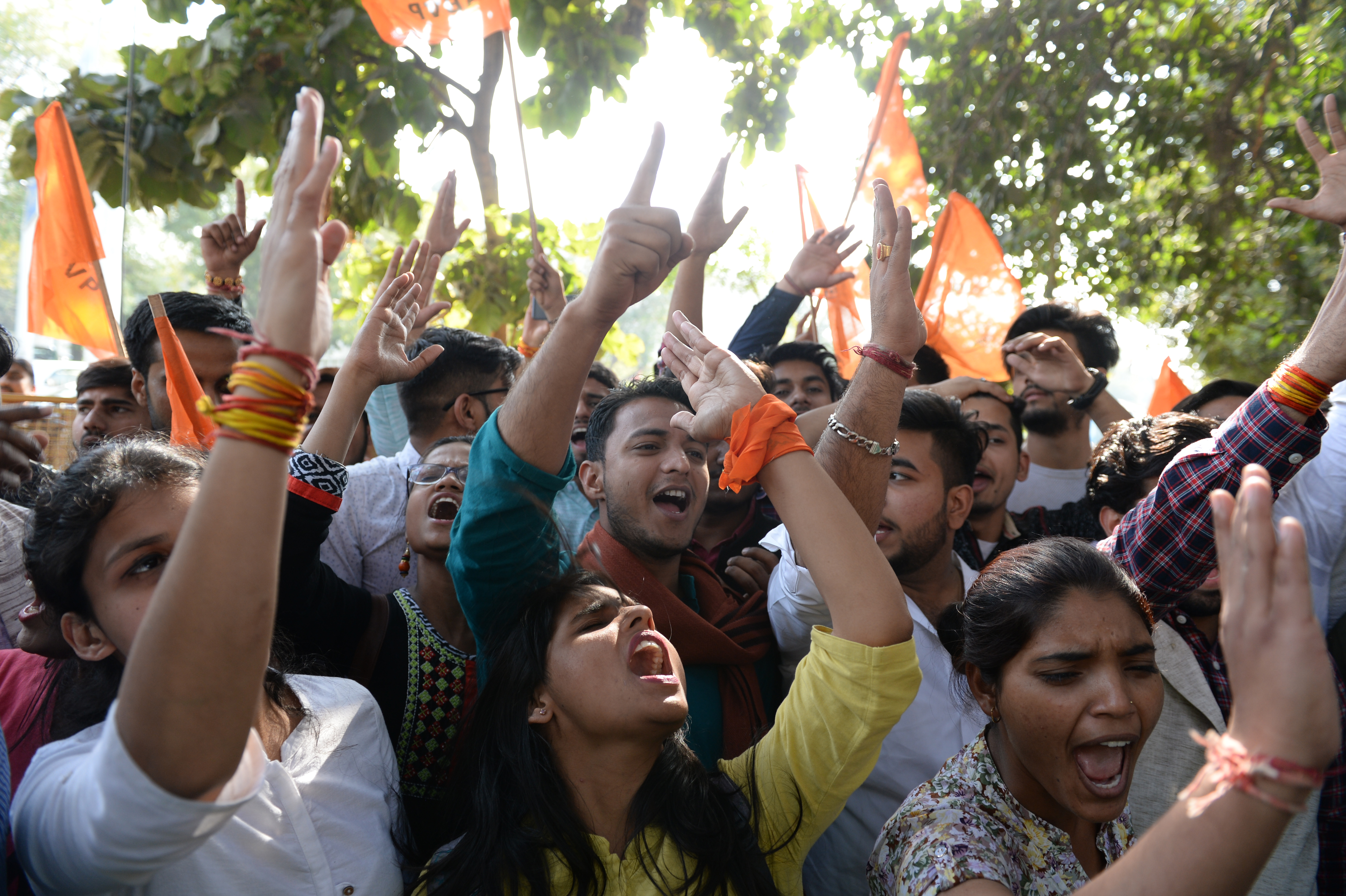Delhi University Students Union elections are due on September 12. Patriot visits North Campus to find out that the campaign is all about colliding ideologies, not about student issues such as library and sports facilities, hostel accommodation and women’s safety
The best way to gauge the future of Indian politics and upcoming politicians is through the prism of student politics. And the epicentre of student politics in the country is here right in Delhi – Delhi University. Considered to be the most glamorous and important student election in the country, the DUSU polls have kickstarted the career of some of the top politicians like Arun Jaitley, Ajay Maken and Alka Lamba.
The campus is in election mode. Various student parties are trying to make their presence felt on campus, and gather as many votes as they can to form the new committee of the students’ union.
But what goes behind this massive election? And what do the students – the voters — think about it? We take a stroll around DU’s North Campus to find out.
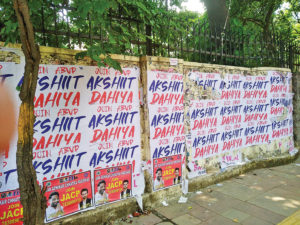
‘Lyngdoh, who?’
Keeping in mind the previous instances where there had been massive overspending of funds in previous student elections, the HRD Ministry under the guidance of the Supreme Court had set up a commission headed by former chief election commissioner JM Lyngdoh which had set some parameters for any student elections around the country.
One of the most notable rules set by the committee was restriction in the use of printed posters and pamphlets in and around the campus during elections – only handwritten posters, that too in limited numbers, should be used.
But the first thing you notice upon entering North Campus are huge banners and hoardings all over the area, wherein the ruling ABVP candidate’s name is written in bold letters. Amidst the huge hoardings and billboards, there are innumerable posters on the walls. NSUI has one or two hoardings as well. In addition, small pamphlets are strewn on the roads. This defacement of public property is a direct violation of the Lyngdoh rules.
Party workers stand at every corner of the street distributing printed pamphlets, their party symbols proudly displayed on the badges on their chest. Parikshit, a second-year student of Kirori Mal College, is distributing pamphlets of ABVP candidate Akshit Dahiya right outside the Vishwavidyalaya Metro Station.
Asked if he knew that he is violating the code of the Lyndoh Commission, he replies, “Lyngdoh, who?” Informed about the prohibition on distributing printed material during elections, he seemed a bit confused, saying that he was just following orders from the higher echelons of his party.
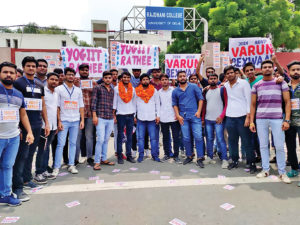
The Lyngdoh Commission also stated that no more than Rs 5,000 should be spent on the campaign of one candidate – that includes everything from campaigns to posters to rallies. But the billboards show that a lot of money is being spent, much in excess of the prescribed limit.
“Just a few days ago, I saw a candidate from ABVP in quite an expensive car, surrounded by party workers on bikes campaigning with loudspeakers”, says Ashish (name changed), a first year economics student of Hindu College.
At the headquarters of the ABVP, when asked them about these blatant violations of the Lyngdoh Commission, students denied the charges and avoided our questions, saying that they had a meeting to attend to, and they were too busy in the elections to attend to the media.
Along with the release of their manifesto, the NSUI launched a campaign “Awaaz uthao, seeti bajao”, (Raise your voice, blow the whistle) wherein their workers would blow whistles every time they saw any instance of discrimination or harassment – be it economic, physical or regarding sexual orientation. They also urged students to use the hashtag #AwaazUthaoSeetiBajao on social media – upon doing which, they would get free movie tickets!

Claim vs truth
In 2018, the ABVP had won the DUSU elections, and the Shakti Singh-led union has completed its full term. So what has the Union achieved in the past year?
A pamphlet titled ‘ABVP-led DUSU Achievements 2018-19’, lists 10 things achieved in the past year. One of the achievements highlighted in bold letters, is the opening of a 24×7 functional library and reading room for all students.
The reality is somewhat different. “The facility is available but it is only for postgraduate students. There is nothing for us undergraduate students – where will we go if we need to study late at night?”, says Arunadoy, a second year English student at Ramjas College.
The pamphlet also claims that they have reconstructed tactile paths for differently-abled students. However, here too the reality is a bit different. Sakshi (name changed), a wheelchair-bound postgraduate student from Miranda House, says that there are special facilities inside her campus, but they are not enough. “Ramps have been there since I started studying in 2017. There have been no new arrangements in the past year”. DUSU president Shakti Singh too, in a fairly recent interview, said that they are planning different tactile paths for the specially abled but the reconstruction is yet to start.
Various students acknowledged that the last academic year saw reservation for the EWS category and the fee rollback of certain hostels. But these were decisions of the college and hostel authorities. What role the students union played is a question mark in itself.
The other ‘achievement’ was the organisation of several campaigns on voter awareness, drug safety and menstrual hygiene. Student elections seem to be much ado that achieves nothing except help the larger political parties to flex their muscles.
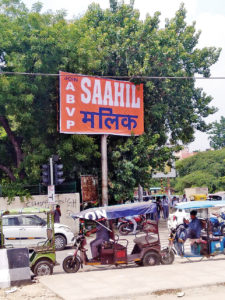
‘Battle’ of ideologies
At numerous Xerox shops near Patel Chest Institute, people were gathered around a particular shop, as if something was going on. On closer look, it turned out to be a fight – a pretty gruesome one at that.
Two girls were at each other’s necks, kicking, punching at scratching each other, while their friends tried to separate them. As blood flowed, they continued abusing each other. Later, Kamala, one of the girls, said that the other was an ABVP worker who taunted her for campaigning for NSUI. When she retaliated, things heated up before long, and soon the battle of words turned into a fistfight. People from both parties gathered, not forgetting to hurl abuses at each other while separating the girls.
“Such instances of violence are quite commonplace during the elections”, said Shyamlal, a stationery shop owner near the area where the catfight took place. “Election hai sir, hota hai. Lad padte hai bacche kabhi kabhi” (This happens during the elections. Kids fight among themselves sometimes), said an ABVP worker who was tending to the other girl.
A few days ago, ABVP had installed busts of Veer Savarkar, Netaji Subhash Chandra Bose and Bhagat Singh inside the campus on August 20, and subsequently removed it after two days. During this time, representatives of the NSUI had blackened Savarkar’s bust, claiming that his ideals do not match the stature of Bose and Singh.
“This whole issue was to impose the ABVP’s agenda of nationalism as one of their main campaigns for this year’s election”, says Rajneesh Tiwari, a member of the AAP affiliated CYSS and a postgraduate student of Hindi at the Faculty of Arts. “First of all, equating Savarkar with Bose and Singh – who were on opposite poles of the ideological spectrum — is totally foolish. So, when sensible people question the move, they are termed as anti-national”, he adds. Similarly, NSUI’s smear campaign too, he says, was staged to unite people of a different ideology to garner votes.
“These people fight based on the legacy of freedom fighters and their ideologies, whereas what they should be doing is focusing on the requirements of the students”, he says, adding that the ABVP, a few days ago were using the abolishment of Article 370 in Kashmir as one of their campaign agendas.
What students want
“I stay in Kamla Nagar and spend around Rs 10,000 a month just on rent”, says Kevin, a student of St Stephen’s College, who hails from Kerala. He says, that he could have saved a lot more money had he got accommodation at a hostel of the Delhi University. Getting through a hostel for a DU student who comes from outside the city can be quite a task.
“There are limited number of rooms in these hostels but the inflow of students like me who are from outside is quite big, and so most of us do not get a room there and have to rent a room nearby at double the price”, says Kevin, adding that many of his friends face the same problem. They want the construction of more hostels so that they can cut costs.
Sarika, a second year student of Miranda House, adds that more steps should be taken to ensure women’s safety. “There are not enough security personnel at night, in addition to the streets not being well lit. Many of us are afraid to go out in the dark, even if we need something”, she says.
Rachita, a batchmate of Sarika’s, echoes the same thoughts. “There should be adequate number of CCTV cameras also”, she adds.
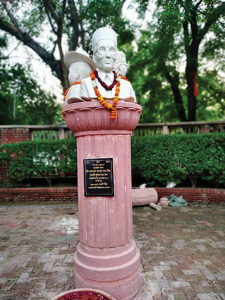
Sharmishtha, a third year student of economics at St Stephens College, says that there should be sanitary pad vending machines at various locations on campus, so that girls don’t miss out on classes during periods.
Pravesh, a professional table tennis player from Kirori Mal College, feels sports facilities on campus are inadequate. “Yes, there are facilities, but not enough to match proper professional standards”. He feels that the DUSU that comes to power this year, should work on this issue.
“Student unions come and go but the issues remain the same. It is the party which comes to power that enjoys all the privileges, while the issues of common students persist”, says Rajneesh, who has been at DU for the past five years. “Let’s hope against hope that DUSU will be different this time”, he concludes.

